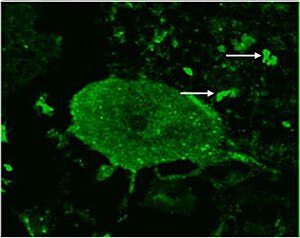സ്റ്റിഫ് പേഴ്സൺ സിൻഡ്രോം
| Stiff-person disease | |
|---|---|
| മറ്റ് പേരുകൾ | Stiff-man syndrome (SMS), Moersch-Woltman syndrome[1] |
 | |
| Cerebellum, Purkinje cell layer, thin arrows show presynaptic terminals stain with the anti-GAD65 monoclonal antibody. | |
| സ്പെഷ്യാലിറ്റി | Neurology |
| ലക്ഷണങ്ങൾ | Stiff muscles, spasms, pain[2][3] |
| സങ്കീർണത | Poor posture, bone fractures, frequent falls, lumbar hyperlordosis[2][1] |
| സാധാരണ തുടക്കം | 20 to 60[3] |
| കാലാവധി | Progressive worsening[3] |
| തരങ്ങൾ | Classic, partial, progressive encephalomyelitis with rigidity and myoclonus (PERM)[3] |
| കാരണങ്ങൾ | Unclear, autoimmune mechanism[2] |
| ഡയഗ്നോസ്റ്റിക് രീതി | Based on symptoms and supported by blood tests and electromyography[3] |
| ഡിഫറൻഷ്യൽ ഡയഗ്നോസിസ് | Parkinsons, multiple sclerosis, fibromyalgia, psychosomatic illness, anxiety[2] |
| Treatment | Diazepam, baclofen, gabapentin, intravenous immunoglobulin[2][4] |
| രോഗനിദാനം | Often poor[4][5] |
| ആവൃത്തി | Rare[1] |
കാലക്രമേണ വഷളായി വരുന്ന പേശീ കാഠിന്യവും തളർച്ചയുമുണ്ടാക്കുന്ന ന്യൂറോളജിക്കൽ ഡിസോർഡറാണ് സ്റ്റിഫ്-പേഴ്സൺ സിൻഡ്രോം (എസ്.പി.എസ്)[6][1]. പ്രധാനമായും കൈകളെയും കാലുകളെയുമാണ് ഈ രോഗം ബാധിക്കുന്നത്[6]. ശബ്ദം, സ്പർശനം, വികാരം എന്നിവയാൽ തളർച്ചക്ക് തുടക്കമാവുന്നതായി കാണുന്നു[1]. നിൽക്കാനുള്ള ബുദ്ധിമുട്ട്, എല്ലുകളുടെ പൊട്ടൽ, ഇടക്കിടെയുള്ള വീഴ്ച എന്നീ പ്രയാസങ്ങൾ ഇതേ തുടർന്നുണ്ടാവുന്നു[6][1][4].
ഈ രോഗാവസ്ഥക്ക് പിന്നിലെ കാരണം ഒട്ടുമിക്ക ആളുകളിലും സ്ഥിരീകരിക്കാൻ കഴിയാറില്ല. ഓട്ടോഇമ്മ്യൂൺ സംവിധാനം ഇതിൽ പങ്കുവഹിക്കുന്നുണ്ടെന്നാണ് കരുതപ്പെടുന്നത്[6]. ടൈപ്പ് 1 പ്രമേഹം തുടങ്ങിയ രോഗാവസ്ഥകളും ഇതുമായി ബന്ധപ്പെട്ടു കിടക്കുന്നു[7]. ഒരു പാരനിയോപ്ലാസ്റ്റിൿ പ്രതിഭാസമായും സ്റ്റിഫ്-പേഴ്സൺ സിൻഡ്രോം അപൂർവ്വമായെങ്കിലും സംഭവിക്കാറുണ്ട്[4]. രക്തത്തിലോ സെറിബ്രൽ സ്പൈനൽ ഫ്ലൂയിഡിലോ കാണപ്പെടുന്ന ഗ്ലുട്ടാമിക് ആസിഡ് ഡികാർബോക്സൈലാസിലെ ആന്റിബോഡികളുടെ ആധിക്യമാണ് ഈ രോഗാവസ്ഥ തിരിച്ചറിയാനായി സഹായിക്കുന്നത്. ഇലക്ട്രോമയോഗ്രഫിയും ഇതിനായി ഉപകാരപ്പെട്ടേക്കാം[6][4][1].
ഡയസെപാം, ബാക്ലോഫെൻ, ഗബാപെന്റിൻ എന്നീ മരുന്നുകൾ രോഗലക്ഷണങ്ങളെ ചികിത്സിക്കാനായി ഉപയോഗിക്കപ്പെടുന്നു[6]. ഇൻട്രാവെനസ് ഇമ്മ്യൂണോഗ്ലോബുലിൻ, പ്ലാസ്മാഫെറേസിസ് എന്നിവയും ചികിത്സക്കായി ഉപയോഗിക്കാവുന്നതാണെങ്കിലും[6][4] പലതരം ആരോഗ്യപ്രശ്നങ്ങൾ ചികിത്സകളുടെ അനന്തരഫലമായി ഉണ്ടായേക്കാം[8][7]. ആയുർദൈർഘ്യം കുറയാനും സാധ്യതയുണ്ട്.[7]
വളരെ അപൂർവ്വമാണ് സ്റ്റിഫ്-പേഴ്സൺ സിൻഡ്രോം രോഗം. ഒരു ദശലക്ഷത്തിലൊരാൾക്ക് എന്ന നിലയിലാണ് ഈ രോഗമുള്ളതായി കാണുന്നത്[4]. സ്ത്രീകളിൽ ഇതിന് പുരുഷന്മാരേക്കാൾ സാധ്യത ഉണ്ട്[6]. സാധാരണഗതിയിൽ 20-60 വയസ്സുള്ളവരിലാണ് ഇതുണ്ടാകാറുള്ളത്[3]. 1956-ലാണ് ഈ രോഗം ആദ്യമായി രേഖപ്പെടുത്തപ്പെടുന്നത്[3].
അവലംബം[തിരുത്തുക]
- ↑ 1.0 1.1 1.2 1.3 1.4 1.5 1.6 "Stiff person syndrome - About the Disease - Genetic and Rare Diseases Information Center". rarediseases.info.nih.gov (in ഇംഗ്ലീഷ്). Archived from the original on 15 November 2022. Retrieved 9 December 2022.
- ↑ 2.0 2.1 2.2 2.3 2.4 "Stiff-Person Syndrome | National Institute of Neurological Disorders and Stroke". www.ninds.nih.gov. Archived from the original on 8 December 2022. Retrieved 9 December 2022.
- ↑ 3.0 3.1 3.2 3.3 3.4 3.5 3.6 Muranova, A; Shanina, E (January 2022). "Stiff Person Syndrome". PMID 34424651.
{{cite journal}}: Cite journal requires|journal=(help) - ↑ 4.0 4.1 4.2 4.3 4.4 4.5 4.6 Ortiz, JF; Ghani, MR; Morillo Cox, Á; Tambo, W; Bashir, F; Wirth, M; Moya, G (9 December 2020). "Stiff-Person Syndrome: A Treatment Update and New Directions". Cureus. 12 (12): e11995. doi:10.7759/cureus.11995. PMID 33437550.
- ↑ Hadavi, S; Noyce, AJ; Leslie, RD; Giovannoni, G (October 2011). "Stiff person syndrome". Practical neurology. 11 (5): 272–82. doi:10.1136/practneurol-2011-000071. PMID 21921002.
- ↑ 6.0 6.1 6.2 6.3 6.4 6.5 6.6 6.7 "Stiff-Person Syndrome | National Institute of Neurological Disorders and Stroke". www.ninds.nih.gov. Archived from the original on 8 December 2022. Retrieved 9 December 2022.
- ↑ 7.0 7.1 7.2 Hadavi, S; Noyce, AJ; Leslie, RD; Giovannoni, G (October 2011). "Stiff person syndrome". Practical neurology. 11 (5): 272–82. doi:10.1136/practneurol-2011-000071. PMID 21921002.
- ↑ Ortiz, JF; Ghani, MR; Morillo Cox, Á; Tambo, W; Bashir, F; Wirth, M; Moya, G (9 December 2020). "Stiff-Person Syndrome: A Treatment Update and New Directions". Cureus. 12 (12): e11995. doi:10.7759/cureus.11995. PMID 33437550.
